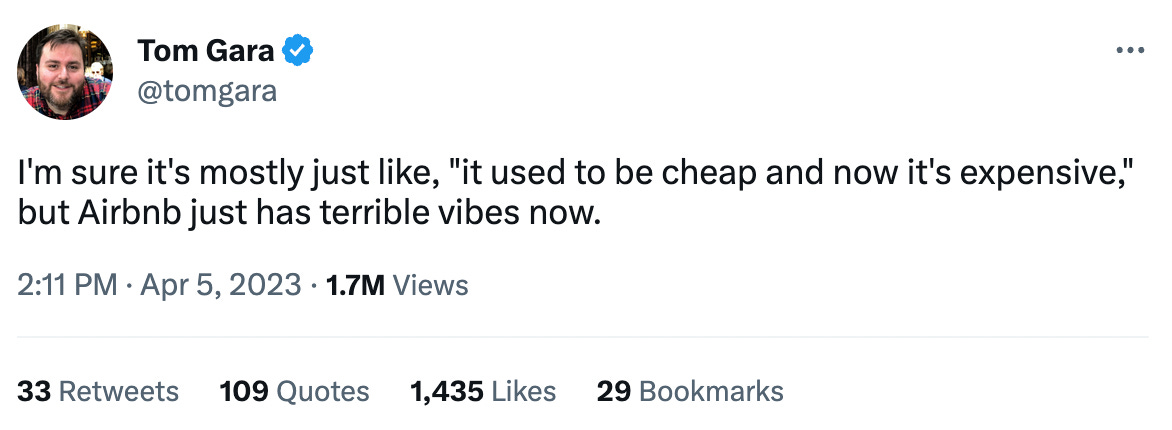Problems at Airbnb (ABNB)
Airbnb (NASDAQ: ABNB — $72.8 billion) is the dominant platform for short-term stays when traveling. Since its 2008 founding, the company has grown to over four million hosts and $8.4 billion in annual revenue derived from a ~14% service fee on guest bookings and an additional ~3% fee levied on Airbnb hosts. Investors view Airbnb as a secular play on travel, a royalty on exploration, and a trusted and indispensable marketplace for millions of disjointed listings from homeowners across the globe. The Bear Cave sees things differently.
An investigation by The Bear Cave has uncovered that amid numerous scandals and horror stories the Airbnb platform has shifted towards professionally managed properties, many of which are now gearing to directly compete against the company. Airbnb’s top professional hosts are building out their own booking platforms and offering cheaper deals to cut out Airbnb, growing their own email lists and distribution, and offering loyalty discounts to book off of Airbnb. In short, Airbnb’s future will look a lot different than its past as the company will now need to compete against its best and largest hosts.
For a sense of the problems at Airbnb, let’s first turn to Twitter where sentiment has shifted aggressively against the platform. Some viral tweets in just the last few days include:
Horror stories of guests staying at individually managed Airbnbs abound the internet including surprise cleaning requirements, last-second cancellations, numerous examples of guests finding hidden cameras in bedrooms and bathrooms, a woman receiving a $7 million settlement from Airbnb regarding a rape that occurred when a prior Airbnb visitor made copies of the apartment key and reentered her rental, the death of three friends from carbon monoxide poising in an Airbnb without carbon monoxide detectors, and last month the company was sued for the death of a 19-month-old child that died from an accidental Fentanyl overdose in an Airbnb that was previously used as a party house.
The solution to these terrible experiences?
In part, the Airbnb community has shifted toward professionally managed properties designed exclusively for short-term rentals. Professional property managers have significant advantages over individual hosts. For example, professional hosts often have better search rankings with “superhost” status from high volumes of experiences, higher conversion with professional photos and copywriting, a better guest experience with fast communication and a reliable check-in process, lower costs due to scale (e.g., cleaning/maintenance), and greater safety and security due to keypad entry, exterior cameras, and background checks on employees.
Those advantages have translated into real results. According to an April 2022 blog post from AirDNA, a vacation rental data company, “Professional property managers represent 1% of all vacation rental hosts, but manage 23% of available listings which generate 35% of total revenue.” The data from AirDNA also shows that professional hosts have been increasing their market share over time.
One fast-growing property management company is Stay Heirloom, “a leading provider of large-format, luxury short-term rentals.” Stay Heirloom appears to manage its own properties and properties on behalf of third parties and today has “over 300 listings in premier cities around the country.” For example, Stay Heirloom offers “serene southern townhomes” in Nashville with eight bedrooms and a rooftop grill and hot tub. On Airbnb, those townhomes are listed for $2,266.96 for April 7 to April 9.
However, Stay Heirloom also lets guests book directly on their site, without going through Airbnb, for only $2,141 — cheaper by about $125, or roughly half of Airbnb’s service fee.

This is no isolated incident.




